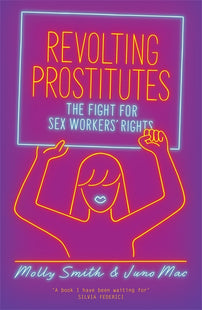On March 8th - WE STRIKE!
Molly Smith on striking in solidarity with sex workers.

A women’s strike is necessary. A women’s strike is impossible. In organising for a women’s strike, we want bring these contradictions into the foreground, to make them unignorable. On March 8th, we strike.
The women’s strike builds solidarity across difference. We work to draw links between all the ways in which women’s work is exploited or taken for granted; all the ways in which resources and autonomy are withheld from us. That means naming work in all it’s forms: our work on shopfloors, our work cleaning offices, our work in brothels, our work in marriage, our work in care homes and our work caring for and raising the next generation of workers. It means the work we must put in to access healthcare – the work of resisting attacks on our reproductive autonomy; the work of accessing trans healthcare. It means the work we must put in to attempt to avoid criminalisation. It means naming our reproductive and domestic work as work alongside our work outside the home. In naming all this as work, we struggle together to make visible ‘all the work we do as women’ and to resist the exploitative conditions we are offered. We work to transform the conditions of our work and of our world.
The women’s strike brings together organisers for reproductive justice, for the decriminalisation of sex work, for an end to violence against women; for worker’s rights and for trans healthcare. We demand bread, roses and hormones for all. We demand an end to racist border policing. Each of these struggles are bound up with the rest.
Last year, the women’s strike shut down Soho to demand the decriminalisation of sex work. On the street, sex workers are criminalised for loitering and soliciting; they are issued with ‘section 21s’ and prostitute cautions, and their clients are criminalised for kerb-crawling. The effect of criminalisation is to push sex workers into the shadows, force them to rush negotiations with clients, and send a clear message to violent people that sex workers are ‘less important’ and in many ways treated by the state as ‘legitimate’ targets for violence. To make matters worse criminal records trap women in prostitution. Indoors, sex workers are criminalised for brothel-keeping if they work with a friend for safety, and the criminalisation of managers means sex workers are unable to access labour law. Sex workers are subject to aggressive immigration policing, and migrant sex workers are routinely deported. The women’s strike stands with sex workers in their demand for decriminalisation, safety and rights: the criminalisation of prostitution is key to how patriarchy denies all women their rights, by dividing us into categories of good and bad. We reject the violence and exploitation that is at the heart of global capitalism, imperialism and criminalisation. When we strike we connect these huge structures to the ‘small’, daily ways in which women’s lives are exploited and constrained.
This March 8th, the women’s strike will once again shut down Soho in solidarity with sex workers: we will collectively refuse to work in order make both our labour and demands visible.
– Molly Smith is a sex worker and activist with the Sex Worker Advocacy and Resistance Movement (SWARM). She is also involved with SCOT-PEP, a sex worker–led charity based in Edinburgh, which is working to decriminalise sex work in Scotland. She has written articles on sex work policy for the Guardian and New Republic and is the co-author, alongside Juno Mac, of Revolting Prostitutes: The Fight for Sex Workers' Rights.
Find out more about the Women's Strike on March 8, 2019.
[book-strip index="1" style="buy"]In Revolting Prostitutes, sex workers Juno Mac and Molly Smith bring a fresh perspective to questions that have long been contentious. Speaking from a growing global sex worker rights movement, and situating their argument firmly within wider questions of migration, work, feminism, and resistance to white supremacy, they make clear that anyone committed to working towards justice and freedom should be in support of the sex worker rights movement.
